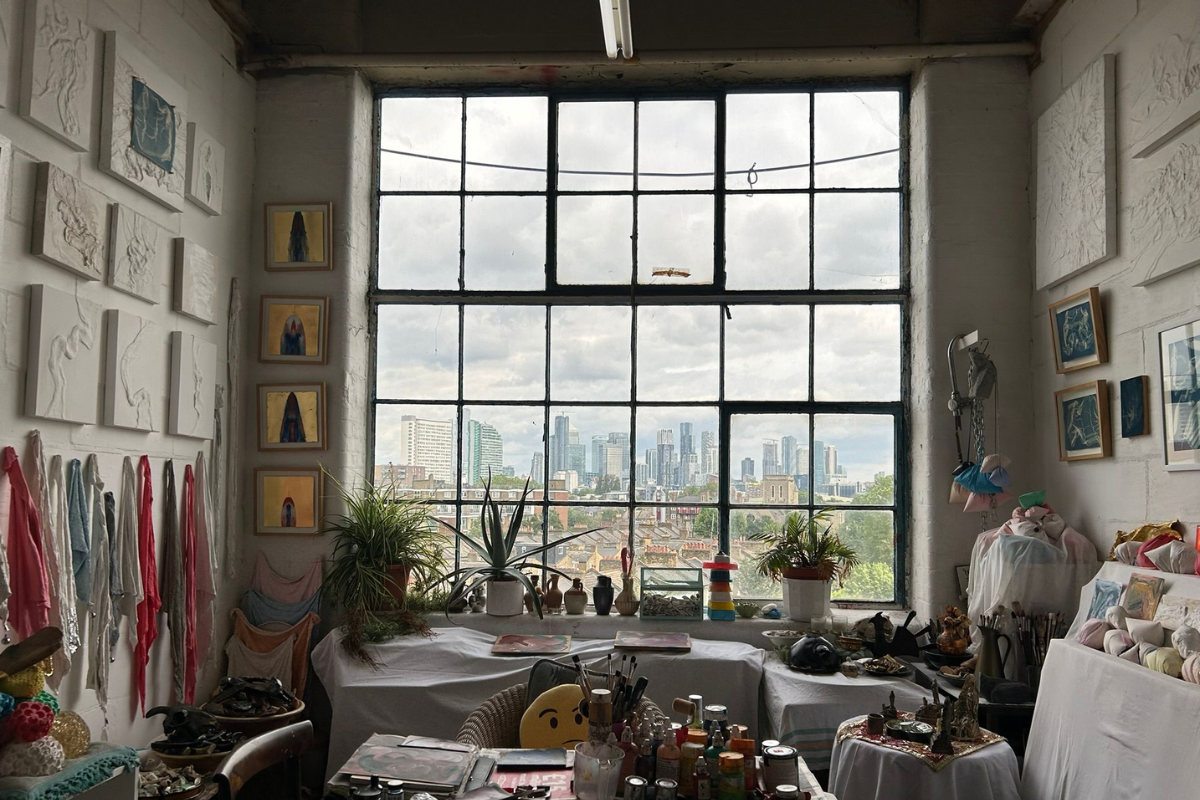
View from an Acme Propeller Factory studio, 2024
Photo: © Acme
Artists’ charity launches appeal to buy historic studio building
Acme said it hopes that by buying the Propeller Factory, it can develop the building to better meet the demand for affordable artists' studios in London.
An organisation that aims to provide affordable artists' studios is asking the public to help it raise more than £4m to purchase the lease of a 1920s factory building in Deptford where 180 artists currently work.
Studio provider Acme has housed artists in the former ship Propeller Factory at Childers Street since 1990, but with its lease ending in 2025, the organisation fears the facility risks being lost, leaving “a gaping hole in the city’s cultural fabric”.
With half the funding to buy the lease on the 70,492 square foot building set to be secured through borrowing, Acme has launched a fundraising appeal to raise the remaining £4m – £5m.
READ MORE
“This is at a time when it is more difficult to be an artist in London than ever. Losing these studios will have far-reaching implications, with many artists unable to continue their practice,” said Acme.
Rents at the factory range between £15.22-£19.00 per square foot per year, inclusive of business rates and service charges, while electricity is metered and charged on top. In an April 2024 survey conducted by Acme of the artists working in the Propeller Factory, 58.5% said they would not be able to continue their studio practice if the building closed.
The organisation said its campaign – London Needs Artists, Artists Need Space in London – will reach out to a range of organisations and individuals as potential donors and has also unveiled an online gifting platform for one-off or monthly contributions of between £15 and £100.
A waiting list of over 1,500
Operating since 1972, Acme claims to be the single largest provider of permanent affordable artist studios in England.
It supports more than 800 individual artists across 15 buildings in Greater London annually, with more than 500 individual studio units as well as live/work studios, space for arts organisations, and mixed-use residential schemes, working in partnership with commercial developers and housing associations.
A registered society under the Co-operative and Community Benefit Societies Act, Acme is regulated by the Financial Conduct Authority but not by the Charity Commission. In 2023, it reported a total turnover of over £3.5m.
Despite the scope of its portfolio, the organisation has over 1,500 artists on its waiting list, 642 of whom specifically want a studio in the Propeller building.
Acme hopes that by purchasing the lease, it can embark on a four-stage plan to develop the building to better meet the demand.
This summer, it intends to open a publicly accessible archive and a flexible event space for volunteer and community groups alongside Acme-programmed workshops and talks. Plans also include providing an exhibition space across large windows at the front of the building.
Stage two of the development would include replacing a large section of the roof for better insulation.
Ultimately, the organisation hopes to expand the site to accommodate 250 artists in 185 studios comprising more than 100,000 square feet of space.
“Acme has supported artists to live and work in London for over 50 years. Artists are the foundation upon which London’s creative and cultural reputation rests. Yet, genuinely affordable spaces to make art are incredibly rare, so we must protect this vital cultural asset,” said Lea O’Loughlin, Co-Director of Acme.
“Places like this are heritage. A building like this, for me, is as important as a museum. It’s a cultural institution that we need to preserve,” added Grayson Perry, who was an Acme tenant from 1986 until 2001.
“I still have friends today that I met through the community of artists that Acme so solidly supported," continued Perry.
“The spaces were rough and cold but dirt cheap, and many a coffee break was spent gossiping whilst huddled round a bottled gas heater. In providing those studios all across the city, Acme played a very important part in British art history.”
Join the Discussion
You must be logged in to post a comment.